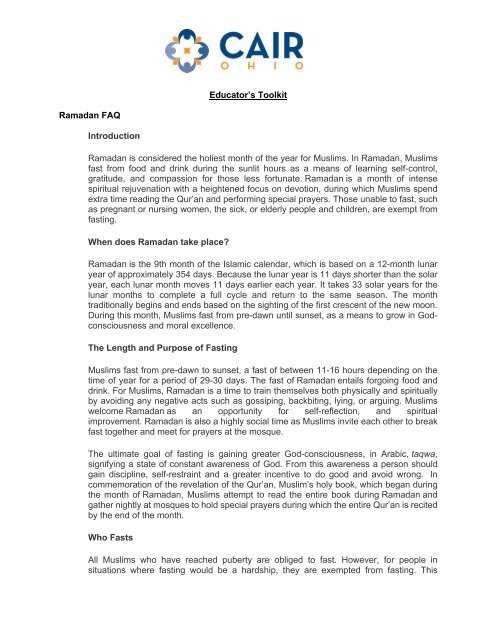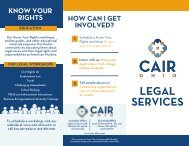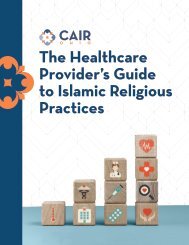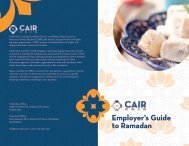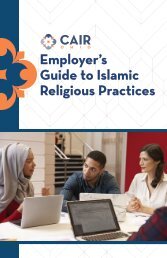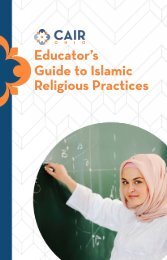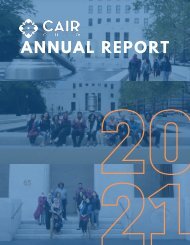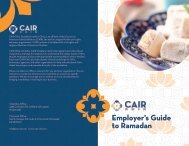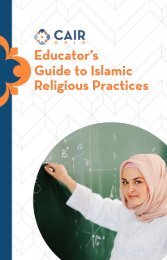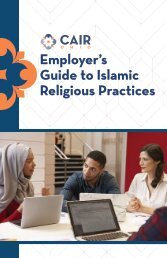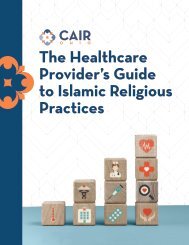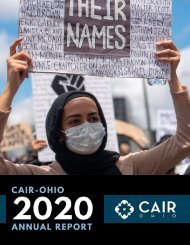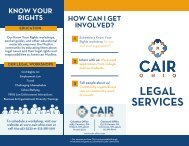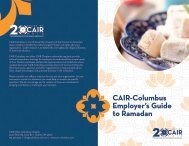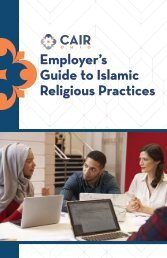Educator's Toolkit
Create successful ePaper yourself
Turn your PDF publications into a flip-book with our unique Google optimized e-Paper software.
Educator’s <strong>Toolkit</strong><br />
Ramadan FAQ<br />
Introduction<br />
Ramadan is considered the holiest month of the year for Muslims. In Ramadan, Muslims<br />
fast from food and drink during the sunlit hours as a means of learning self-control,<br />
gratitude, and compassion for those less fortunate. Ramadan is a month of intense<br />
spiritual rejuvenation with a heightened focus on devotion, during which Muslims spend<br />
extra time reading the Qur’an and performing special prayers. Those unable to fast, such<br />
as pregnant or nursing women, the sick, or elderly people and children, are exempt from<br />
fasting.<br />
When does Ramadan take place?<br />
Ramadan is the 9th month of the Islamic calendar, which is based on a 12-month lunar<br />
year of approximately 354 days. Because the lunar year is 11 days shorter than the solar<br />
year, each lunar month moves 11 days earlier each year. It takes 33 solar years for the<br />
lunar months to complete a full cycle and return to the same season. The month<br />
traditionally begins and ends based on the sighting of the first crescent of the new moon.<br />
During this month, Muslims fast from pre-dawn until sunset, as a means to grow in Godconsciousness<br />
and moral excellence.<br />
The Length and Purpose of Fasting<br />
Muslims fast from pre-dawn to sunset, a fast of between 11-16 hours depending on the<br />
time of year for a period of 29-30 days. The fast of Ramadan entails forgoing food and<br />
drink. For Muslims, Ramadan is a time to train themselves both physically and spiritually<br />
by avoiding any negative acts such as gossiping, backbiting, lying, or arguing. Muslims<br />
welcome Ramadan as an opportunity for self-reflection, and spiritual<br />
improvement. Ramadan is also a highly social time as Muslims invite each other to break<br />
fast together and meet for prayers at the mosque.<br />
The ultimate goal of fasting is gaining greater God-consciousness, in Arabic, taqwa,<br />
signifying a state of constant awareness of God. From this awareness a person should<br />
gain discipline, self-restraint and a greater incentive to do good and avoid wrong. In<br />
commemoration of the revelation of the Qur’an, Muslim’s holy book, which began during<br />
the month of Ramadan, Muslims attempt to read the entire book during Ramadan and<br />
gather nightly at mosques to hold special prayers during which the entire Qur’an is recited<br />
by the end of the month.<br />
Who Fasts<br />
All Muslims who have reached puberty are obliged to fast. However, for people in<br />
situations where fasting would be a hardship, they are exempted from fasting. This
includes anyone who is sick or traveling; women who are pregnant, nursing, or on their<br />
menses; or older people who are too weak or ill to fast. Anyone who is exempted must<br />
make up the fast later, except for those who cannot fast due to age or chronic illness.<br />
Instead, they can feed a poor person for every day of fasting they miss.<br />
Children<br />
While children are not required to fast until they reach puberty, it is customary for children<br />
beginning around seven years of age to perform limited or symbolic fasting such as fasting<br />
half days or on weekends. This trains them gradually and helps to engender a sense of<br />
inclusion during the month-long observance. Mosques often give special recognition to<br />
children who are fasting their first full day or first Ramadan.<br />
Family Routines<br />
A Muslim family usually rises about 5:00 a.m. before the first of dawn and eats a modest,<br />
breakfast-like meal called suhur. After the meal, the family performs the morning prayer,<br />
and depending on the circumstances, the family goes back to bed or begins the day.<br />
Particularly during the long summer months, people often take a nap in the late afternoon<br />
after work or school. At sunset, family members break the fast with a few dates and water,<br />
and depending on the culture, other light foods such as soup, appetizers or fruit. This is<br />
referred to as iftar which means “breaking the fast.” After performing the sunset prayers,<br />
the family eats dinner. Inviting guests to break the fast or going to someone else’s house<br />
for iftar is very common in Ramadan. Many families then go to the mosque for the night<br />
prayer and a special Ramadan prayer called taraweeh. After completing their prayers, the<br />
families return home around 11:45 p.m. (All of these times vary depending on the time of<br />
year, with shorter days in the winter and longer days in the summer.)<br />
Eid al-Fitr<br />
At the end of Ramadan, Muslims celebrate one of their major holidays called Eid al-Fitr or<br />
the “Festival of the Breaking of the Fast.” Children traditionally receive new clothes, money<br />
or gifts from parents, relatives and friends. A special prayer and sermon are held the<br />
morning of Eid day, followed by a community celebration usually in a park or large hall.<br />
Food, games and presents for children are important parts of the festivities, as friends and<br />
family spend the day socializing, eating and reuniting with old acquaintances.<br />
Ramadan Resources<br />
Article: 9 Ways to Support Students During Ramadan<br />
Source: We Are Teachers<br />
Article: In Consideration of Ramadan<br />
Source: Teaching Tolerance website<br />
Article: How teachers can support students during Ramadan<br />
Source: PBS Newshour
PBS Learning Media<br />
Grades Title Description<br />
K-4 Eid al Fitr | All About<br />
the Holidays<br />
K-5 Peg+Cat | Eid-Al-<br />
Adha Adventure<br />
K-4 Eid Al-Adha | All<br />
About the Holidays<br />
Eid al Fitr is a three-day holiday that ends the Islamic<br />
month of Ramadan. Known as the "Festival of breaking<br />
fast," Muslims will celebrate with family and food after<br />
the end of a long fast, joining with one another for<br />
prayer and other traditions.<br />
Join Peg+Cat as they learn about the Muslim holiday<br />
Eid-Al-Adha from their friends Yasmina and Amir. In<br />
addition to exploring how Muslim's celebrate the<br />
holiday, students also explore the mathematical<br />
concepts of less than (), fractions,<br />
and how to create equal amounts.<br />
Eid Al-Adha is a yearly four-day celebration of the<br />
Islamic faith remembering the story of Abraham. Known<br />
as the feast of sacrifice, the celebration centers around<br />
sacrifice to Allah.<br />
1-8 Ramadan Nadia, a young Muslim-American girl, describes the<br />
celebration of Ramadan, in which Muslims fast, or go<br />
without food and drink, during the day. She narrates a<br />
day in the life of her family of parents and siblings as<br />
she completes the fast for a whole day. Nadia explains<br />
when Ramadan happens, what happens from the<br />
beginning to the end of the day, and what it means for<br />
adults and children. The video ends with a description<br />
of the holiday celebration that ends the fasting<br />
6-12 Ramadan is Here |<br />
Religion and Ethics<br />
Weekly<br />
"Ramadan is that really intense, focused way of fasting<br />
and working on our own selves," says Rahim Ulla, "and<br />
then working on our relationships to others and<br />
ultimately to God."
Here are some books to introduce Ramadan to students of various ages:<br />
Ramadan Moon<br />
The Best Eid Ever<br />
Golden Domes and<br />
Silver Lanterns<br />
Lailah's Lunch Box<br />
A Party in Ramadan<br />
Crescent Moons and<br />
Pointed Minarets: A<br />
Muslim Book of Shapes<br />
The Night of the Moon<br />
Its Ramadan, Curious<br />
George<br />
The Proudest Blue: A<br />
Story of Hijab and<br />
Family


